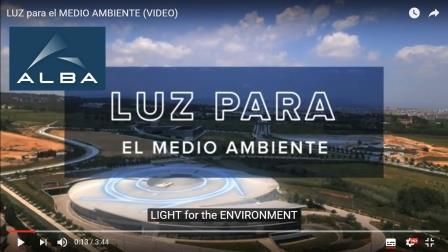
11/01/2017
ALBA Synchrotron Is Also a Tool for the Environment
ALBA Synchrotron Is Also a Tool for the Environment
Environment, health, food, cultural heritage ... ALBA synchrotron's users coming from universities and research centres explain in short videos how they have taken advantage of the synchrotron light and how it can benefit for their research.
The fourth of these videos posted on line just before Christmas is focused on environmental issues. Jordi Llorca, professor at the Universitat Politècnica de Catalunya (UPC), explains how the study, design and production of new catalysts can have a positive impact on environment. In that case, Jordi Llorca and his team have used the ALBA synchrotron CIRCE beamline, a variable polarization soft X-ray beamline dedicated to advanced photoemission experiments.
Thanks to CIRCE, these researchers have successfully analyzed the surfaces and the mechanisms of action of catalyst nanoparticles in conditions very close to actual conditions of use. These results allow the design of new catalysts, especially in two domains of special interest for Jordi Llorca’s team: catalysts to produce hydrogen and catalysts to oxidize the carbon soot emitted by diesel engines.
Please follow the ALBA’s Youtube channel to watch the complete series of these outreach videos. They are filmed in Spanish and Catalan, although subtitles are available in English, Catalan and Spanish using the Settings button and in many more languages with the Auto-translate option.
The fourth of these videos posted on line just before Christmas is focused on environmental issues. Jordi Llorca, professor at the Universitat Politècnica de Catalunya (UPC), explains how the study, design and production of new catalysts can have a positive impact on environment. In that case, Jordi Llorca and his team have used the ALBA synchrotron CIRCE beamline, a variable polarization soft X-ray beamline dedicated to advanced photoemission experiments.
Thanks to CIRCE, these researchers have successfully analyzed the surfaces and the mechanisms of action of catalyst nanoparticles in conditions very close to actual conditions of use. These results allow the design of new catalysts, especially in two domains of special interest for Jordi Llorca’s team: catalysts to produce hydrogen and catalysts to oxidize the carbon soot emitted by diesel engines.
Please follow the ALBA’s Youtube channel to watch the complete series of these outreach videos. They are filmed in Spanish and Catalan, although subtitles are available in English, Catalan and Spanish using the Settings button and in many more languages with the Auto-translate option.
More news
03/01/2020
AllRead MLT, a success story originated from the PRUAB’s Ideas Generation Program
06/11/2019
SENER, a top-class aerospace systems provider
29/10/2019
The ICN2 research center is involved in the quantum revolution
21/10/2019
Stradivarius keeps growing
19/09/2019
The president of Catalonia visited the Barcelona Synchrotron Park
12/09/2019
Alba, a tool to tackle challenges in the fields of renewable energy production and fight against air pollution









